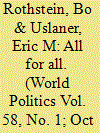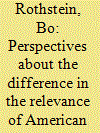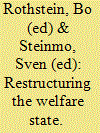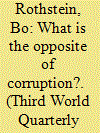|
|
|
Sort Order |
|
|
|
Items / Page
|
|
|
|
|
|
|
| Srl | Item |
| 1 |
ID:
071927


|
|
|
|
|
| Publication |
2005.
|
| Summary/Abstract |
The importance of social trust has become widely accepted in the social sciences. A number of explanations have been put forward for the stark variation in social trust among countries. Among these, participation in voluntary associations received most attention. Yet there is scant evidence that participation can lead to trust. In this article, the authors examine a variable that has not gotten the attention it deserves in the discussion about the sources of generalized trust, namely, equality. They conceptualize equality along two dimensions: economic equality and equality of opportunity. The omission of both these dimensions of equality in the social capital literature is peculiar for several reasons. First, it is obvious that the countries that score highest on social trust also rank highest on economic equality, namely, the Nordic countries, the Netherlands, and Canada. Second, these countries have put a lot of effort in creating equality of opportunity, not least in regard to their policies for public education, health care, labor market opportunities, and (more recently) gender equality. The argument for increasing social trust by reducing inequality has largely been ignored in the policy debates about social trust. Social capital research has to a large extent been used by several governments and policy organizations to send a message to people that the bad things in their society are caused by too little volunteering. The policy implications that follow from the authors' research is that the low levels of trust and social capital that plague many countries are caused by too little government action to reduce inequality. However, many countries with low levels of social trust and social capital may be stuck in what is known as a social trap. The logic of such a situation is the following. Social trust will not increase because massive social inequality prevails, but the public policies that could remedy this situation cannot be established precisely because there is a genuine lack of trust. This lack of trust concerns both "other people" and the government institutions that are needed to implement universal policies.
|
|
|
|
|
|
|
|
|
|
|
|
|
|
|
|
| 2 |
ID:
149356


|
|
|
| 3 |
ID:
046817


|
|
|
|
|
| Publication |
New York, Palgrave Macmillan, 2002.
|
| Description |
ix, 224p.
|
| Standard Number |
0312296282
|
|
|
|
|
|
|
|
|
|
|
|
Copies: C:1/I:0,R:0,Q:0
Circulation
| Accession# | Call# | Current Location | Status | Policy | Location |
| 046854 | 361.613/ROT 046854 | Main | On Shelf | General | |
|
|
|
|
| 4 |
ID:
134286


|
|
|
|
|
| Publication |
2014.
|
| Summary/Abstract |
Corruption has turned out to be difficult to define and what should be counted as the opposite to corruption remains widely disputed. If the goal for a post-conflict society is not only to become democratic and prevent a return to violence but also to reduce systemic corruption, we need to know what it is that should be fought and how the opposite to systemic corruption should be conceptualised. To define the opposite to corruption, choices have to be made along four conceptual dimensions. These are universalism vs relativism, uni- vs multidimensionality, normative vs empirical and whether the definition should relate to political procedures or policy substance. As a result of this conceptual analysis, it is argued, a universal, one-dimensional, normative and procedural definition should be preferred. The suggested definition is that of impartiality as the basic norm for the implementation of laws and policies. This conceptual analysis ends with a discussion of why such a norm has historically and in the contemporary world been hard to achieve and why it is especially problematic in post-conflict societies.
|
|
|
|
|
|
|
|
|
|
|
|
|
|
|
|
|
|
|
|
|